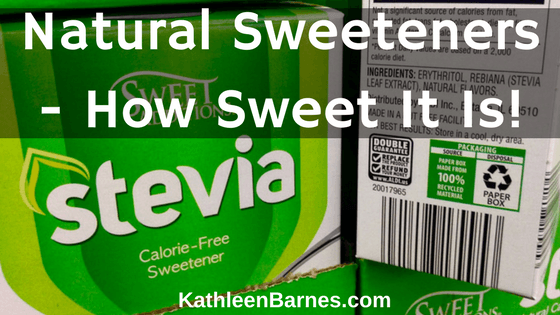We all love sweet tastes. In fact, we are hard-wired to be attracted to sweetness. Mother Nature wants to eat the sweetest, most luscious, ripest fruit.
But you know we’ve translated that to a love to soft drinks, cakes, pies, cookies and all sorts of sugar-laden junk that takes a terrible toll on our health.
I’ve written tons of stuff about the dangers of sugar, so today I’m going to give you the low-down on healthy sweeteners.
Just be aware than any kind of sweetener can trigger cravings for more sweets.
Stevia
Stevia, a zero calorie sweetener with a glycemic index of zero is my favorite hands down. Yes, you must be very careful about the amount you use because it can tip between sweetness and bitterness when you get even a tiny bit too much.
Stevia comes from a mint-like plant common in Central and South America. Its leaves are 30 to 50 times sweeter than table sugar. I’ve actually grown it in my garden and when fall frosts come, I take the leaves and freeze them in ice-cube trays with mixed results, again because it’s hard to control the amount and that bitter aftertaste is terrible.
Health benefits
Besides being an excellent no calorie sweetener that is acceptable for people with diabetes, studies suggest that stevia can actually help improve insulin production in people with diabetes.
Research also shows that stevia:
- Reduces blood sugars by as much as 18%
- Reduces blood pressure, as opposed to the common cheap sugar fructose, which has been shown to increase the risk of hypertension by as much as 30%
- Is an antioxidants that fights free radical damage
- Reduces tooth decay
- Is a weight control aid since it has no calories
In a well-referenced article, the Life Extension Foundation says that hundreds of foods and beverages throughout the world are sweetened with stevia sweeteners. Among these are Vitamin Water®, Coke Zero®, Sprite Green®, Gatorade’s G2® and Crystal Light®. Coca-Cola® and Pepsi Cola® have both disclosed their intentions to use rebaudioside A, the sweetest stevia extract, as a zero-calorie soft-drink sweetener in the US. There are still many health risks with soft drinks, so, even if they are sweetened with stevia, I don’t recommend them.
Beware of fillers
Many stevia products contain fillers (including maltodextrin and erythritol from corn, which is likely to be GMO tainted) to help with portion control and these fillers can override the healthy aspects of the product. I like Sweet Leaf best, although it does contain inulin, which may cause problems for people with digestive issues.
I suggest you try various brands of stevia and see which suits your taste buds best.
Monkfruit
Monkfruit is fairly new on the healthy natural zero- calorie sweeteners market, this Chinese herb is sometimes markets as “lo han.”
It’s been used in China for hundred of years to treat obesity and diabetes.
Research is positive
There’s not a lot of research on monkfruit, but it has been shown to be a strong antioxidants with anti-inflammatory benefits, it may have some anti-cancer properties.
Unlike most fruits, monk fruit isn’t sweet because of natural sugars. It contains a unique type of antioxidant called mogroside that provides a level of sweetness upwards of 200 to 500 times greater than table sugar, so again there can be portion control issues.
Monkfruit is also more heat stable than stevia, making it a better option for baking.
Beware of Nectresse and other monkfruit products that contain fillers much like the stevia widely available on the market. In both cases look for products that contain 100% monkfruit. Chinese groceries are a great source, according to a friend who is a great lover of lo han. It’s much cheaper there than online.
Agave—thumbs down
I know many people are huge fans of agave as a so-called “natural” sweetener.
It’s no better than table sugar and is processed very much like table sugar. It’s contains as much as 90% fructose, a sweetener that we know is a notorious for all sorts of health risks, including increased risk of cancer and suppression of the satiety hormone leptin, meaning it promotes weight gain. Compare that fructose content to that of high fructose corn syrup (55%).
It is also higher in calories than table sugar, weigh in at 60 calories per tablespoon, compared to 40 calories per tablespoon of sugar. It is highly refined and definitely not suitable for people with diabetes. IN fact studies show agave worsens insulin resistance and blood sugar metabolism.
Stay away from agave.
For more articles from Kathleen about sugar and natural sweeteners, check this list of posts.







